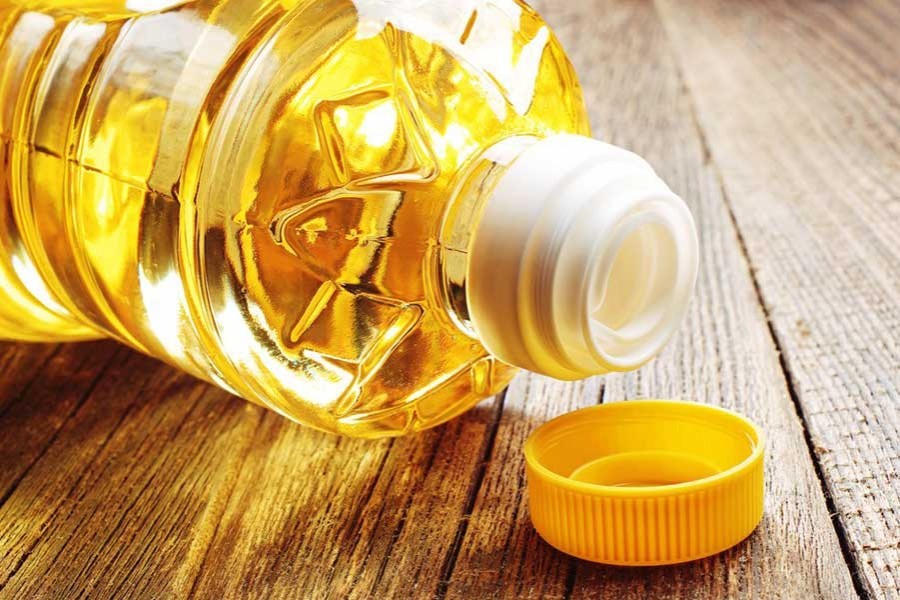Two days have gone following the government's decision to cut VAT on imports, but normalcy is yet to return to the cooking-oil market amid heightened monitoring.
Insiders said grocers did not get adequate soybean oil, especially one-litre jars, on Saturday, even 48 hours after the government's vow to stabilise the market.
Visiting retailers in different kitchen markets and groceries in Dhaka city, the FE found a slight decline in oil prices but were still much higher than the government-set rates.
On Friday, groceries retailed loose palm oil at Tk 160-162 a litre, loose soybean at Tk 168-172 a litre (Tk 185-190 a kg) and one-litre soybean jar at Tk 168-175 and five-litre jar at Tk 790-830.
The government fixed maximum retail prices at Tk 133, Tk 143, Tk 168 and Tk 795 respectively.
Juel Rana, a West-Dhanmondi grocer, says his shop has running without cooking oils since March 02.
"Normally, I sell one- and two-litre jars to students and middle-income families who are now sourcing oil from distant markets at much higher rates," he told the FE.
"I ordered 100 one-litre soybean jars and 50 two-litre jars from two distributors at Sher-e-Bangla Road and Rayerbazar on February 26 but didn't get oil yet."
"A representative of a distributor told me that it would take one or two more days to deliver oil after getting those from the refiners," says Mr Rana.
Mrittyunjay Sarker, distributor of a leading refiner, told the FE that millers were yet to decide whether to sell soybean oil at Tk 168-180 a litre at retail level.
"On February 26, refiners told us that MRP of soybean oil will be Tk 180 from March 01, but we didn't get such jars yet and sources of them are now saying jars with Tk 168 a litre tag might be supplied again."
However, some groceries sold old five-litre jars at the previous rates of Tk 790-830 on Saturday.
Farid Uddin, a grocer at Town Hall Bazar in Mohammadpur area, says they are still trading in some old bottles. When asked, he said distributors did not tell them anything about prices following VAT cuts.
"We've bought oil at Tk 760 a jar from the distributors and are selling as per MRP," Mr Farid added.
Amirul Islam Shekhar, a vendor at Nawabganjbazar adjacent to Beribadh says many traders like him are in a trap as they bought loose oil at Tk 176-178 a litre wholesale from Moulvibazar in late February.
The government agency concerned is scouting outlets for any rigging and filing cases if loose soybean is sold at more than Tk 143 a litre, he adds.
According to Mr Shekhar, most of the vendors have stopped selling loose oil and many are selling at Tk 168-172 a litre which was Tk 178-181 a few days ago.
Super palm oil is still selling at Tk 160-162 a litre.
The vendor says prices of soybean oil has showed a decline in the capital's Moulvibazar market but still was selling at Tk 165-166 a litre wholesale.
No refiners responded to requests for comment.
Last Thursday, the government decided to relieve imported oil of taxes following calls from commerce ministry and the apex trade body FBCCI.
"To keep commodity prices at a tolerable level, we've lifted VAT on some items," finance minister AHM Mustafa Kamal told the media after a meeting of the cabinet committee on public purchase that day.
According to refiners, the government realises 35-per cent VAT on imported edible oil-first 15 per cent at import stage, then 15 per cent at production (refining) stage and 5.0 per cent at trading stage.
This VAT was the same in 2019 when edible oil was below $800 per tonne globally which has increased to a staggering $1,800 in 2022, according to them.
Bangladesh imports 95 per cent of its edible oil demand of 2.2-2.6 million tonnes.
Insiders say the Russia-Ukraine war amid coronavirus has made the global commodity market most volatile in 14 years, also affecting the Bangladesh market.


